- Home
- Nancy Mitford
Madame de Pompadour Page 2
Madame de Pompadour Read online
Page 2
At fifteen the King was a big strong boy, forward for his age. His fiancée, who lived in the palace, was still only five; a golden-haired darling, she appeared with him at all the State functions, trotted round after him like a little pet, and was considered absolutely sweet. But boys of fifteen loathe sweet little girls and he felt humiliated at having such a small fiancée. He sulked whenever he saw her. The marriage was to be consummated in ten years’ time, and meanwhile what? The King was obviously quite ready to consummate something at once; the sooner this last descendant of a royal line, this ‘conjugation of the blood of Henri IV’, five of whose children were his ancestors, was given a chance to breed, the better. M. le Duc was very much of this opinion because the next heir to the throne was the Duc d’Orléans, and the Orléans and Condé branches of the Bourbon family were at daggers drawn. (The feud between them was fanned by the Dowager Duchesses who were sisters, daughters of Louis XIV and Madame de Montespan.) Furthermore, if the King were not married soon, one of two things could be expected to happen. Either he would take a mistress, who, at his age, would certainly acquire a dangerous influence over him, or he would turn to the boys. Pederasty was by no means unknown among the Bourbon; Louis XIII had certainly preferred men to women, while many of the courtiers could remember the egregious Monsieur, with his bracelets, and high-heeled shoes, and high-pitched squabbles. He was a direct ancestor of Louis XV. There had recently been a homosexual scandal among young dukes, attached to the King and very little older than him. The Regent had taken measures at once, and they had received the heavy punishment of exile to their estates, accompanied by wives who had quickly been found for them. When the King asked what they had done he was told that they had torn up railings in the park; he made no comment, but he must have known that they would not have been sent away for that. Thereafter they were always called ‘les arracheurs de palissades’. The First Gentleman of the Bedchamber, the Duc de La Trémoïlle, agreeable, amusing, was seen to have the tastes of a young lady; he spent his time eating sweets and doing embroidery. He too was married off and sent home, so furious that for seven years he turned his back on his unlucky wife. After much hesitation, pushed to it finally by a serious illness of the King, M. le Duc made up his mind that the Infanta must return to Spain and the King be married to somebody of an age to have children; the risk of offending the Spaniards was less grave than that of waiting.
In fact, Philipe V was exceedingly angry. ‘Ah! the traitor!’ he cried, and the courtiers in his ante-room were filled with a terrified curiosity to know whom the traitor might be. However the Queen, Elizabeth Farnese, who ruled the King, remained calm and merely said: ‘We must send at once to meet the Infanta.’
The hurdle of the Infanta’s return having been cleared without mishap, M. le Duc began to study lists of princesses to take her place. There were nearly forty in all, but they boiled down to very few suitable ones. French and Lorrainer princesses were ruled out at once because they had Orléans or Bourbon Condé blood and neither family would consent to such an elevation of the other. Princess Anne of England was a Lutheran and the English would not allow her to change her religion; the daughter of Peter the Great, the future Tzarina Elizabeth, was too parvenue and was also said to show signs of incipient madness, as did the King of Portugal, who had an otherwise eligible daughter. The Princess of Hesse-Rhinevelt would have done very well if her mother had not been in the habit of giving birth alternately to daughters and hares (according to Mathieu Marais who does not enlarge upon this curious statement). M. le Duc, thinking, perhaps, that there was room for any amount of hares at Chantilly, finally married her himself.
Enormous bets were placed on these various ladies, odds lengthening and shortening according to the day’s rumours; the Court seemed to be living on the eve of some important race. At last the choice fell upon a very dark horse indeed; Marie Leczinska, daughter of the penniless, exiled Stanislas Leczinski, King of Poland. A princess who knew no cosmetics but water and snow and who spent her time embroidering altar cloths was not at first sight a very suitable person to reign at Versailles. No doubt M. le Duc and Madame de Prie thought that, since she would owe everything to them, she would help them to keep their position. In fact, the marriage, regarded as a final proof of their incompetence, greatly facilitated Fleury’s efforts to get rid of them. It was a poor marriage for the King of France, this lady, ‘dont le nom est en ski’, being endowed with neither worldly goods, nor powerful family connexions, nor beauty, nor even youth, since she was seven years older than the King. But she had a sweet nature and regal manner, as even the most disagreeable of her subjects were obliged to admit, when they knew her; above all she was very healthy.
When Stanislas received a letter asking for her hand he could not believe his luck. He rushed to his daughter’s room crying: ‘Kneel, kneel and give thanks to God Almighty!’
‘What has happened – are you going back, as King, to Poland?’
‘Far better than that, you are going, as Queen, to France.’
As soon as she arrived at Versailles the King fell in love with her and fell into bed with her; on their wedding night he gave her proof of his love seven times. The courtiers were delighted, and Maréchal de Villars said that none of his cadets could have done better. Nine months later she produced twin daughters, Madame Première and Madame Henriette; by the time the King was twenty-seven they had ten children, of whom six daughters and a son reached maturity. He thought, and continually said, that his wife was the most beautiful woman at Versailles, and for years this marriage went very well. They might have been happy ever after, that is to say, Marie Leczinska might have played the part of mistress as well as that of wife, if she had had more character. Louis XV was a man of habit, a faithful man at heart, so shy, too, that he found it very difficult to make advances to any woman; he disliked new faces, and beautiful faces intimidated him. His little love affairs with girls of easy virtue, found for him by his valets, meant nothing at all to him, and his family meant a great deal. Unfortunately the Queen, though a good woman, was dowdy and a bore; she was incapable of forming a society that would attract a gay young husband, and she surrounded herself with the dullest, stuffiest element at the Court. After the birth of her children she settled comfortably, and rather selfishly, into middle age; she made no effort to remain attractive to her young husband, to share his interests or to entertain his friends; fashion and fun meant nothing to her. She had no temperament at all, complaining that she was for ever ‘in bed, or pregnant, or brought to bed’, and any excuse was good enough to keep the King out of her bed. As she was extremely pious, he had never been allowed there on the days of the major saints. By degrees the saints for whom he was excluded became more numerous and less important; finally, he was kept out by one so utterly unknown that he flew into a temper. He told Lebel, the palace concierge, to bring him a woman. Lebel went off and found a pretty housemaid, and the result was ‘Dorigny le Dauphin’, who became an art dealer of some distinction.
Nobody quite knows when the liaison between Louis XV and the Comtesse de Mailly began, but the King himself cannot have thought it very serious until 1739. That year he refused to go to his Easter duties. Asked by the Bishop whether he would touch for the King’s Evil as usual on Easter Day, he said no, since this ceremony could only take place after communion and he did not intend to communicate. His Jesuit confessor, Père de Lignières, wishing to avoid a scandal, suggested that Cardinal de Rohan might say a low mass in the King’s cabinet, after which nobody would know for certain whether he had or had not confessed. The King absolutely refused to lend himself to such a fraud. He was living in adultery and had no intention, for the present, of mending his ways; but at the same time he was not going to make a mockery of his religion.
Madame de Mailly was a daughter of the Marquis de Nesle, whose family name was Mailly; she had married her first cousin. Madame de Nesle, her mother, was a lady-in-waiting to the Queen, and the King had always known the Mailly sisters. She w
as not a beauty, or in any way very romantic, but a jolly, downright, sporting woman with whom he felt at ease. She never asked for anything, neither for power nor for money; she loved him. But in 1740 he fell in love with her sister, whom she had unwisely invited to all her suppers and parties; the Marquise de Vintimille was even less of a beauty and much less nice than Madame de Mailly, and behaved with the greatest unkindness to her. The affair did not last very long; Madame de Vintimille died giving birth to the King’s baby, the Comte du Luc. The King was heart-broken; he went back to Madame de Mailly and she adopted the baby, who was exactly like him to look at, and always known as ‘le demi-Louis’. But this lady’s troubles were not yet over. Very soon the King fell desperately in love, much more than he had been with Madame de Vintimille, with yet another sister, the Duchesse de Châteauroux.
Madame de Châteauroux was an intelligent, ambitious beauty who wanted to make her mark in French history. She made the King work harder with his ministers than he had ever done before. Seeing that he was still rather fond of her sister she forced him to exile her from the Court; Madame de Mailly went off in floods of tears and was thereafter known as The Widow. The King missed her, and corresponded with her surreptitiously; but Madame de Châteauroux soon found out and put a stop to that. ‘Madame, you are killing me’, he would say as she insisted that he should give his attention more and more to the dull details of public affairs. ‘So much the better, Sire; a king should continually die and be resuscitated.’ She was odious to the Queen and made a breach between her and the King which was never repaired; husband and wife never felt easy in each other’s company again.
Madame de Châteauroux was the central figure in the ‘Metz incident’ which made a deep impression on the King; to the end of his days he could not speak of the scenes of Metz without horror. Fond of campaigning, as he was fond of hunting, he went, in 1744, to join his army on the Eastern frontier and took with him an enormous train, including Madame de Châteauroux and yet another Mailly sister, the Duchesse de Lauraguais. At Metz he fell seriously ill, with pains in the head and a high fever; the usual bleedings and purges had no effect and the doctor announced that his life was in danger. There was talk of the Last Sacrament, which would, of course, entail confession and the departure of the mistress. She, meanwhile, mounted guard over him, with her great friend the Duc de Richelieu, First Gentleman of the Bedchamber. Nobody else was allowed to see him alone and they pretended to him that his illness was nothing at all. It could not be kept up. He knew that he was very ill, and getting worse all the time; at last he kissed her and said: ‘Princess’ (his pet name for her), ‘I think we shall have to part.’ He gave orders that she and Madame de Lauraguais should go at once, and that the Queen should be sent for; then he confessed.
The Bishops of Metz and Soissons, about to bring the Holy Sacrament from the cathedral to the King’s bedside, heard that Madame de Châteauroux and her sister were still in Richelieu’s house in the town; they sent a message to the effect that Our Lord was awaiting the departure of the Duchesses; who then had no choice but to leave for Paris. Before communicating, the King was induced by the Bishops to make a public statement of repentance; all those who were in his ante-room, that is to say the officers of state and the high bourgeoisie of Metz, were brought in to his bedside to hear him do so. He was very weak and hardly spoke as if he wanted to recover; he said that perhaps it was God’s will to give his people a better king. When the Queen arrived, he received her affectionately and begged her pardon. He was very civil to the Dauphin, never a pleasant apparition to a possibly dying young king, and seemed in fact to be in a repentant state of mind and to have every intention, should he live, of changing his ways.
But the French clergy, who had taken the affair in hand, made blunder after blunder. To an intensely shy, reserved and proud man, the thought of his public confession was humiliating enough as he came back to his normal state of health; now it was printed and distributed to every parish in France so that each priest could make a sermon on it, embellished with his own views on the sin of adultery. This proceeding shocked many sensible and God-fearing citizens, who felt that the King should have been allowed to repent in private, and that all the women of the Court should have been sent away together, so that the affair with Madame de Châteauroux could have ended without publicity. As soon as the King was better, a lady-in-waiting, prompted by his confessor, put a second pillow into the Queen’s bed. Rumour had it that the Queen had taken to rouge again. At the most frivolous Court in the world, where everything was treated as a joke, all this provoked gales of laughter, and M. de Richelieu, who held a watching brief for Madame de Châteauroux, certainly did not shelter the King from these gales. The country, however, felt very differently about the whole matter. The handsome young King was enormously popular and the French had worked themselves up to a state of despair when they believed him to be dying. The reaction to better news caused a mafficking such as has rarely been seen in Paris – people embracing each other in the streets and embracing the horses which had brought the messengers. It was at this time that Louis XV received the name of Well Beloved. But in their transports of joy his subjects did not omit to underline their detestation of his mistress; and, whenever she appeared in public, she was booed, hissed, pelted with eggs and almost lynched. She retired to bed with a complete breakdown.
With his courtiers giggling in his ante-room and his clergy and people moralizing to his face, the King forgot all his good resolutions. He was determined to show that he was not going to be bullied into a new life, to show who was the master; besides he longed very much for Madame de Châteauroux. As soon as he got home to Versailles he sent for her. She was in her house in the rue du Bac, feverish and furious. When the King’s message came, not wishing to delay their reunion, she got up, had a bath, and prepared to leave. The effort was too much for her; she became very ill indeed and a few days later she died of pneumonia.
The King was now thirty-four years old.
2
Paris and Madame d’Etioles
VERY LITTLE OF Paris as we know it today existed in the 1720’s; no Place de la Concorde, Madeleine, or rue de Rivoli, the Louvre half its present size, no Ecole Militaire or Panthéon, no bridge between the Pont Royal and the Pont de Sèvres, no big thoroughfares or boulevards. The layout was that of an overgrown village; narrow streets surrounded the houses of rich merchants and of the ennobled lawyers known as the noblesse de robe, very much despised by the noblesse d’épée, the old feudal families. The streets were noisier, the traffic blocks even more terrible than they are today. They were filthy dirty and it was impossible to walk in them when there had been rain without getting mud up to the knees. On the outskirts of this town, rich nobles and merchants were building a garden city, the faubourgs whose wide streets led out to the country. Each house, of a pale honey colour, stood in its own big garden, full, in summer, of orange trees and oleanders. Every house of any size had an orangery. The quays did not exist; gardens went down to the river where the boats and barges of their owners were moored. Many of these houses are still in existence, but, too often, squashed between nineteenth- or twentieth-century blocks of flats, they would be unrecognizable to their former owners. A few Hôtels, Matignon, Biron, Charost (the present British Embassy) and the Elysée, for instance, have kept their gardens, and from them we can judge how the others must have looked. The forest was at their door; la Muette, in the Bois de Boulogne, was still one of the King’s hunts.
Jeanne-Antoinette Poisson, the future Marquise de Pompadour, was not born in one of these splendid new mansions, but in the rue Cléry, then, as now, situated in the heart of the town. Her mother was a beauty, so she has been accorded various fathers by various biographers, but it is probable that her mother’s husband, M. Poisson, was the real one. He certainly thought so. Poisson was a jolly bourgeois, steward to the Pâris brothers, who ran the economy of France. The Pâris were nearly as important in the life of Mlle Poisson as her own family – ind
eed Pâris-Duverney is one of the possible fathers – and they were deeply attached to her. Pâris de Monmartel, the little girl’s godfather, was Court banker; Pâris-Duverney supplied the army; their power was almost unlimited. They could support or starve out the generals at the front, make or ruin politicians; the King himself was dependent on them when he wanted to realize large sums of money for any reason; and he used them in all his financial transactions. They were responsible to no government department and always refused the various ministries which were offered them. Their own riches were said to be fabulous, but when Pâris-Duverney died he left so little money that, in the nineteenth century, his coffin was opened to see if he had not, by any chance, been buried in gold. Of course they have been called rogues and worse, but on the whole the verdict of their contemporaries was favourable. Maréchal de Saxe thought the world of them, and said that they were entirely public spirited; they always supported him up to the hilt, partly, no doubt, because they saw he was worth supporting. But whether these mysterious brothers – there were four of them, but only two come into this story – were good or bad, or like most people, a mixture of both, it was clearly a wrong principle for the country’s finances to be in the hands of one family concern. In private life they were patrons of art, great collectors, and frequented the cultivated society of other rich bourgeois; their clever, reassuring, genial faces, above a broad expanse of embroidered waistcoat, look out from several canvases of the day; they must have been delightful fellow guests.

 The Blessing
The Blessing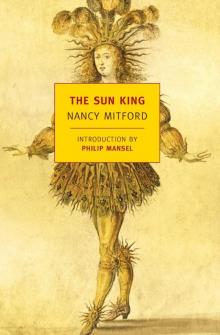 The Sun King
The Sun King Wigs on the Green
Wigs on the Green Love in a Cold Climate
Love in a Cold Climate The Penguin Complete Novels of Nancy Mitford
The Penguin Complete Novels of Nancy Mitford The Pursuit of Love
The Pursuit of Love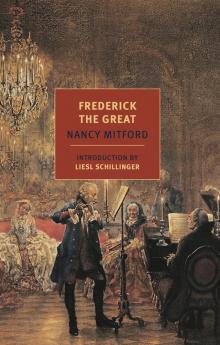 Frederick the Great
Frederick the Great Highland Fling
Highland Fling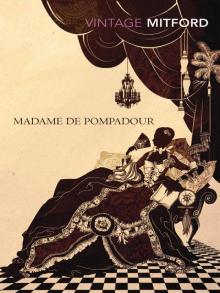 Madame de Pompadour
Madame de Pompadour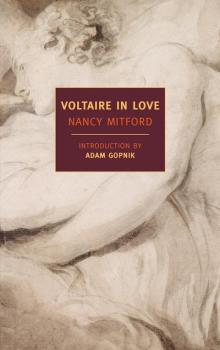 Voltaire in Love
Voltaire in Love Don't Tell Alfred
Don't Tell Alfred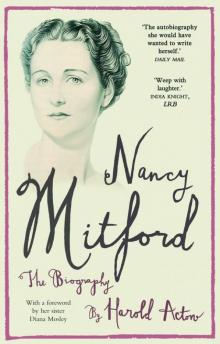 Nancy Mitford
Nancy Mitford Christmas Pudding and Pigeon Pie
Christmas Pudding and Pigeon Pie